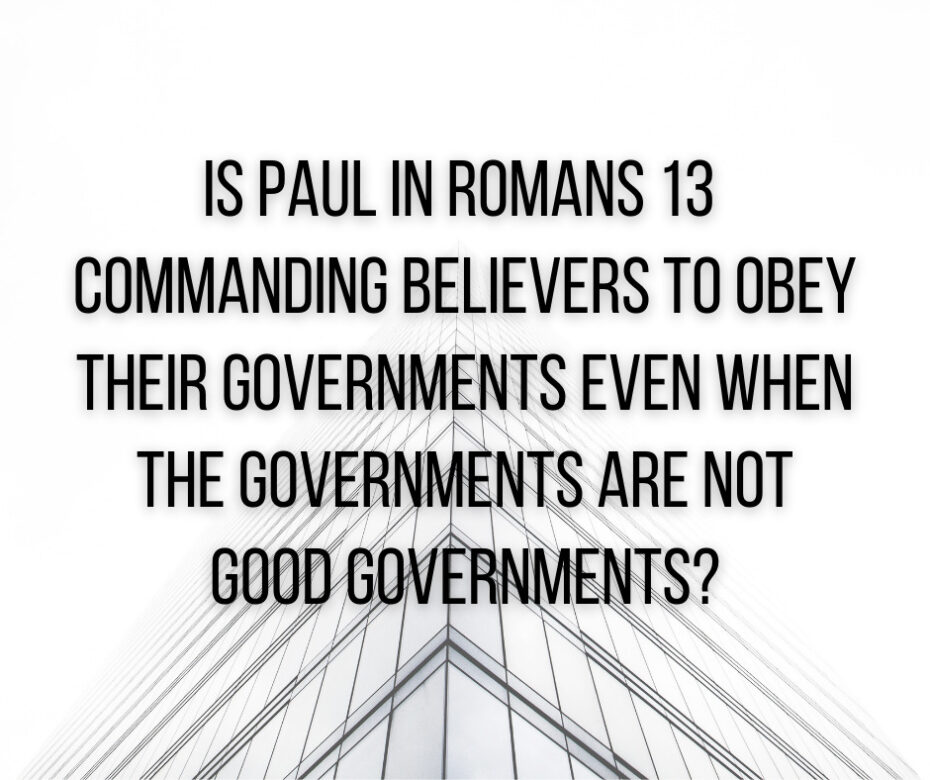A few weeks ago, I wrote a blog about the American Revolution. I suggested that it was a violation of Scripture. In my answer, I discussed Romans 13. While I received some emails praising me for what I wrote, I received many more questioning my understanding of Scripture and of life.
Ray asks five questions about Romans 13:
Q: Do you believe that government rulers are required to obey God and His commands in their government duties?
A: Yes and no. They are required to obey God if they wish to please Him and gain His blessings. But they are not required to obey Him in order to be in power. (Of course, if they disobey Him, He may remove them from office. See a dramatic example where God removed Herod from power in Acts 12:20-23.) The authorities in Jesus’ day did not obey God. The authorities in the days of the Apostles did not either. Hitler, Stalin, and Mao all murdered tens of millions of people and yet they stayed in power for decades.Q: If a Ruler makes laws that contradict God’s laws and commands is that an authoritative law?
A: Yes and no. Yes, they are authoritative in the sense that those who disobey the commands will be punished in some way (fines, imprisonment, community service). No, they are not authoritative in the sense that believers must obey them. Believers are to obey God in cases where the government contradicts His laws. However, it is easy for believers to justify disobeying laws they do not like even when those laws do not contradict God’s laws. I’ve met believers who teach that we should not pay taxes since the government uses much of our tax money for things that are not good. Yet Jesus said that believers were to render taxes to Caesar and Caesar did lots of things that were not good.Q: Are the authorities in Rom 13:1 limited to the types of Rulers described in Romans 13:3-4 where the Rulers/authorities in verses 3-4 are ones who punish evildoers (as God defines evil) and protects and commends the righteous people in society?
A: I understand Paul to be speaking proverbially here. Generally speaking, rulers punish evil acts, not good acts. Of course, there have been exceptions in human history (Hitler, Stalin, Mao, Pol Pot). But Paul is not discussing exceptions.Q: Is it possible that when Paul says in Rom 13:1 that all authorities are put there by God, that Paul is speaking in general terms regarding authority in general [idea of government authorities are approved, and parent authority, boss authority, etc.] but Paul is NOT saying each specific Ruler was approved by God?
A: The word Paul uses at the end of Rom 13:1 is appointed (tetagmenoi), not approved (dokimoi). God does not approve of all rulers. But in some sense all rulers are appointed by Him. I think the way to understand that is that God allows people to rise to power and He takes them out of power when He wishes. Paul is saying that each specific ruler is appointed by God.Q: When God commanded Israel to overthrow the Canaanites in the promised land and Canaanites had Rulers and authorities and kill them and take all their land and possessions, was God violating Romans 13 since Israel was rebelling against the Ruling authorities that God had established in Canaan?
A: Of course not. Israel was a separate country. Israel overthrew other countries in war at the direction of God. God does not forbid war. In fact, at times He commands it. When the new nation came to Kadesh Barnea and refused to go up and take the Promised Land, they were judged by God. All those aged twenty and over died during the next thirty-eight years without being permitted to enter the Land, with the exceptions of Joshua and Caleb.
It is not a sin for a believer to disobey the government in the specific case where it is requiring believers to disobey God (Dan 3:1-30; 6:1-28; Acts 5:29). In fact, it is a sin for a believer to disobey God even if he is obeying the government.
It is a sin for a believer to disobey the government in other cases. Believers are not free to disobey the government any time they wish. I’ve been a believer for 48 years. I do not recall a time when I needed to disobey the government in order to obey God.
Underlying Ray’s questions is the desire for a righteous government. I absolutely share his desire. But I know, as he does, that we will not have a perfect government until Jesus returns and establishes His kingdom. We should long for that day. In a sense, when we suffer because we are tormented by the wickedness that is found among elected officials, we are suffering for our faith (2 Pet 2:7-8). “Come, Lord Jesus” should be our daily prayer (Rev 22:20).


